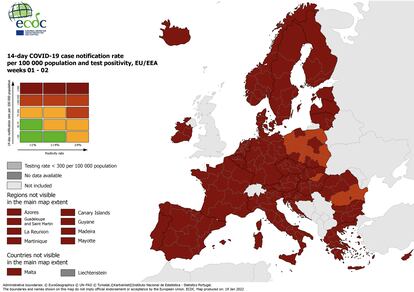The European Union will take the first step next week towards a new model for managing the pandemic that aims to withdraw the generalized restrictions used until now to stop covid-19.
The Council of the EU plans to approve on Tuesday the suppression of the contagion map as a guide for the establishment of limitations on movement between countries, a change aimed at facilitating mobility and recovering a certain normality.
The imposition of measures such as the provision of a negative test or quarantines will no longer depend on the geographical origin of the traveler, but on the status of their covid certificate.
People who have been vaccinated, who have overcome the disease or have passed a negative test will be able to move freely. The cumulative incidence map for 14 days, prepared by the European Center for Disease Control and Prevention (ECDC) and which until now determined the possibilities of movement in each region, will continue to be updated weekly, but will have a merely informative character.
The European Commission had already proposed in November last year the suppression of restrictions or preventive measures applied in a generalized way to a region or country based on its incidence rate. Brussels believed then that travel should only be restricted in areas with a very high rate of infection and a low vaccination rate. But the change was blocked by the appearance of the omicron variant, detected in South Africa at the end of that same month of November.
But once the risk of the new variant has been verified, Brussels believes that the time has come to move towards the application of personalized restrictions, which will restrict or condition the movement of each person based on their own health situation.
The changes already point towards what has been called the
flu
in the management of the pandemic, that is, on the basis of criteria similar to those of flu epidemics.
The European Commissioner for Health, Stella Kyriakides, warns, however, about the need to maintain caution.
"It is still a dangerous virus," he stressed this week in an interview with EL PAÍS.
And he added that the great cascade of infections caused by the omicron “is enough to overwhelm many health systems”, so they are “seeing an increase in hospitalizations, for example, in the US with a number of patients and especially children who enter the hospital”.
But in principle, according to the Recommendation that is expected to be approved on Tuesday, people who can prove full vaccination, who have overcome the disease or who present a negative test, may not be forced to undergo new tests or quarantine regardless of epidemiological situation of their country of origin.
The change was endorsed last Friday at the diplomatic level by the 27 member states of the EU.
And the official approval will correspond to the Council of Ministers of General Affairs, which this Tuesday celebrates its monthly meeting in Brussels.
The new Recommendation, which updates the one approved in 2020 during the early stages of the pandemic, will establish "a personalized approach and not by the geographical area of origin of the travellers", according to the text agreed on Friday by the European ambassadors and to which it has had access to EL PAÍS.
The same text indicates that “the ECDC maps have a basically informative function”.
Map that weights the cumulative incidence in 14 days and the positivity of diagnostic tests in the EU regions and that serves to establish the level of restrictions (20-1-2022)ECDC
Brussels considers that this change is in line with the high vaccination rate and the speed with which the current variant of the virus spreads.
Curiously, the omicron stopped the change at the end of last year.
But now it has made it easier by verifying that despite the rapid escalation in infections, the number of hospitalizations has remained relatively under control, at least in countries with high vaccination rates.
The new Recommendation also confirms that the validity of the covid certificate after completing the vaccination schedule will be nine months, as approved by the European Commission by way of urgency at the end of last year.
The measure aims to promote the distribution of the booster dose, which has already been administered to 40% of the adult population in the EU.
The accreditation of having passed the disease will remain valid for 180 days.
In the case of PCR tests, there are no changes and the negative result will be valid for up to 72 hours before starting the trip.
But in the case of antigens, the term is reduced and the validity goes from 48 hours to only 24 hours.
paradoxical moments
The changes come at one of the most paradoxical moments of the pandemic.
Almost all the countries of the Union are at the incidence levels considered until now as the highest risk (more than 500 cases per 100,000 inhabitants), according to the map published last Thursday by the ECDC.
At the same time, in most European countries, social or mobility restrictions are being relaxed in view of the fact that hospitalizations and deaths from covid-19 have not increased as feared.
"The ECDC encourages countries to make the transition from an emergency surveillance system to more sustainable and goal-oriented ones," a spokesperson for that community body told this newspaper last week. Several European countries have reduced quarantine periods in case of contagion or close contact with a person who has tested positive. In Belgium, a criterion for imposing restrictions was adopted on Friday that is no longer based on the number of infections but on the degree of hospital saturation and the occupation of intensive care units. And outside the EU, the United Kingdom is already advocating an almost complete return to normality and treating covid-19 as just another epidemic.
In favor of relaxation is the high vaccination rate, which reaches almost 75% of the total population of the EU with one dose and 70% with the complete regimen.
But Brussels warns that the high speed of spread of the omicron can overwhelm hospital systems.
And the loss of effectiveness of vaccination could cause new moments of health crisis if the third dose does not stop infections or is not effective against the omicron.




/cloudfront-eu-central-1.images.arcpublishing.com/prisa/3FI7KHR4GI7ABUOQDZ3ENWASZQ.jpg)



